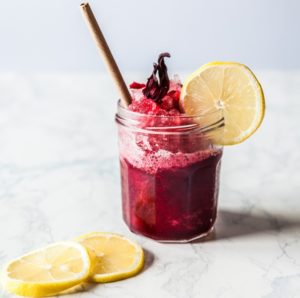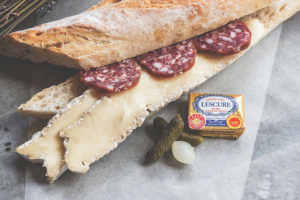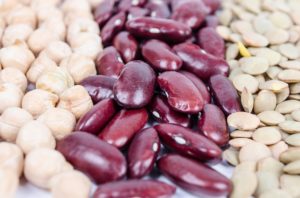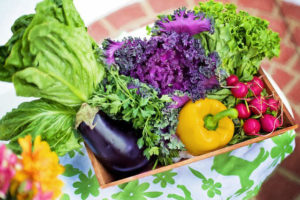 1. Eat more plants! Research has proven over and over that there is an inextricable link between the amount of fruits and vegetables people eat per day and their risk of cancer. It’s unusual for dieticians to say this, but for fruits and veg, ‘the more the better’. Aim for 2-3 cups vegetables/salad per day, and 3-5 fresh fruits per day. Cut your cancer risk starting today.
1. Eat more plants! Research has proven over and over that there is an inextricable link between the amount of fruits and vegetables people eat per day and their risk of cancer. It’s unusual for dieticians to say this, but for fruits and veg, ‘the more the better’. Aim for 2-3 cups vegetables/salad per day, and 3-5 fresh fruits per day. Cut your cancer risk starting today.
2. Eat much less animal-based fats (saturated fats). Any fat that comes from an animal is linked to cardiovascular disease and inflammatory stress in the body. So, full cream dairy (or even a lot of low fat dairy), cheeses, chicken skin, butter, lard, fatty meat and bones (e.g. shin bones) increase your risk of cancer. Unfortunately, some plant oils are also saturated and have the same effect: coconut oil and palm kernel oil are two of the most well-known of these oils. Rather use olive oil, canola oil, sesame oil or avocado oil.
 3. Don’t take huge doses of vitamins and supplements to prevent cancer. Research has shown that taking very high doses of ‘supplemental’ antioxidants is NOT linked to increased protection against cancers. In fact, very high megadoses of some vitamins can cause more harm than good. Meet your antioxidant needs by following point #1.
3. Don’t take huge doses of vitamins and supplements to prevent cancer. Research has shown that taking very high doses of ‘supplemental’ antioxidants is NOT linked to increased protection against cancers. In fact, very high megadoses of some vitamins can cause more harm than good. Meet your antioxidant needs by following point #1.
4. Cut smoking. There are no positive attributes to smoking. It just kills. And, most smokers don’t like eating fruit. Double whammy.
5. Increase exercise. The trick is to hit the top of the upside-down U-curve: too little exercise is associated with disease and harm. However, too MUCH exercise (over-training and too intense) is just as harmful. Learning what is right for your body type, age, weight and fitness level is imperative to exercise at a perfect level for maximum health benefits. Ask your local Biokineticist.

6. Start moving away from all animal products. We all know the extremely strong link between processed meats and cancer. However, research has now shown the link between all inflammatory disease (including cancer) and amount of animal products are eaten (including the new ‘bone broth’ fad. The benefits are unfounded in research and the practice simply pushes up the amount of animal-based product in a lifestyle that is ALREADY too high in animal foods). The trick is NOT to suddenly turn vegan in one day. This will be too difficult to sustain and often mistakes are made because too little is understood about what is balanced in veganism.
However, what I advise my patients is to follow 2 main premises:
- Where possible, replace animal products with plant ones (e.g. use soya milk in porridge, instead of dairy. Or use vegan protein replacers, such as the Fry’s chicken-style burger patties instead of real chicken burgers). Plant-based protein substitutes have come a VERY long way in terms of flavour and authenticity.
- Bit by bit convert meals to vegan meals. For instance, the “No Meat on Mondays” campaign has taken the world by storm and is a great way to start exploring the wonderful options available. With just one day a week, you have already cut your cancer risk from animal products by 14%. Pretty good, I’d say! Watch my growing library of vegan recipe videos on YouTube, for some inspiration!
7. Cut down on alcohol. Yes, red wine does contain anti-oxidants such as resveratrol. But the amount that would need to be consumed in order to have the resveratrol benefits would be outweighed by the carcinogenic effects of overdoing the alcohol. Moderation is always the key. And having 4 tots of alcohol a week won’t really make a dent in your health. But having more? Fun, but not healthy!
 8. Eat loads of beans, chick peas and lentils. This one is simple. They are plant-based, very high in protein and the fibre and nutrients in them reduce the incidence of many disorders including cancer risk, cholesterol problems, poor gut health, colon cancer, blood pressure and gout, amongst others. If they make you particularly ‘musical’, increase the volumes you have slowly and daily. And check your probiotics.
8. Eat loads of beans, chick peas and lentils. This one is simple. They are plant-based, very high in protein and the fibre and nutrients in them reduce the incidence of many disorders including cancer risk, cholesterol problems, poor gut health, colon cancer, blood pressure and gout, amongst others. If they make you particularly ‘musical’, increase the volumes you have slowly and daily. And check your probiotics.
9. Take probiotics! These are the fabulously vital little ‘good’ bacteria that are supposed to live in our gastrointestinal tract. For 100s of years, humans have not lived with fridges, and so have consumed large amounts of bacteria from fermented and bacteria-filled foods. Now we refrigerate and irradiate everything, we can’t get enough of these little miracles, and so BAD bacteria build up and create wind, bloating, cramping, IBS etc. Help is at hand with home-grown Kefir kits of simply good quality probiotic supplements which have been shown to reduce inflammation in the body and cancer.
 10. Have brightly-coloured foods. Many foods contain potent antioxidants, especially those with very bright or dark colours. Foods like broccoli, spinach and kale are super, as are berries, chillies and peppers. Bright orange veggies such as butternut, pumpkin and carrots also have powerful antioxidants, but remember that the beta-carotene found in carrots is MUCH MORE BIOAVAILABLE if cooked!
10. Have brightly-coloured foods. Many foods contain potent antioxidants, especially those with very bright or dark colours. Foods like broccoli, spinach and kale are super, as are berries, chillies and peppers. Bright orange veggies such as butternut, pumpkin and carrots also have powerful antioxidants, but remember that the beta-carotene found in carrots is MUCH MORE BIOAVAILABLE if cooked!
11. Eat Brassica vegetables as often as possible. The brassicas have a magic substance in them called Glutathion which is a primary liver detoxifier. So, the more cabbage, broccoli, cauliflower or brussel sprouts you eat, the less risk you have of developing cancer.
12. Reduced intake of fizzy cold-drinks. Not only does the ‘fizz’ leach calcium out of bones leading to osteoporosis, but the excess intake of concentrated sugar replaces good food and overworks many organs in your body.
Water. Water. Water.
It’s easy.
See my online books for easy recipes that are quick, delicious and healthy (but often taste more indulgent than you’d believe!)
Learn more... about plant-based eating and healthy food.
Follow my Facebook business page; Tabitha Hume – Clinical Dietician for weekly hints and tips



